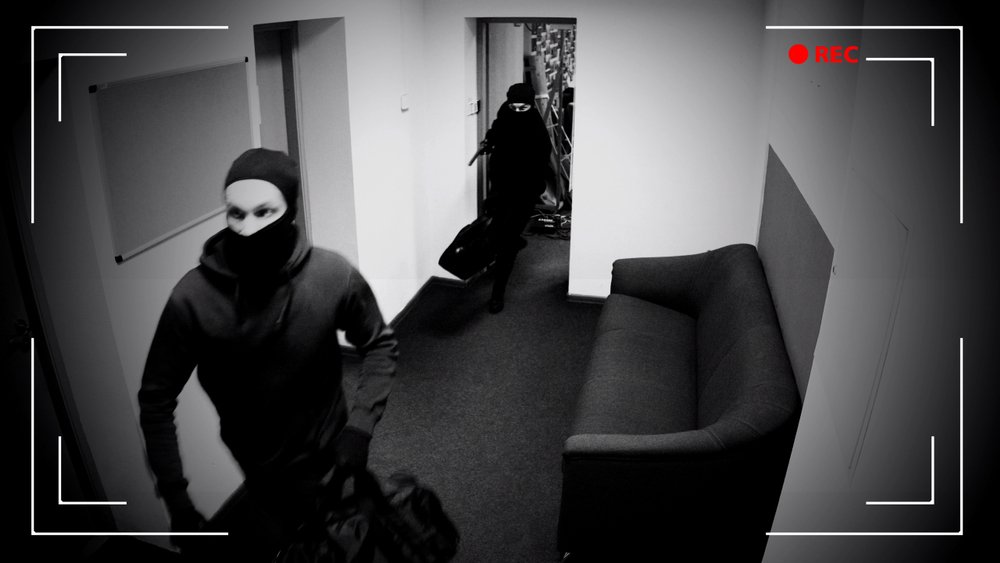Under Arizona law, burglary is the offense where a person enters a building, home, yard, or structure and commits theft or a felony once inside. The crime is sometimes referred to as breaking and entering. Depending on the circumstances, a prosecutor can charge three different degrees of burglary:
- first-degree burglary, per ARS 13-1508,
- second-degree burglary, per ARS 13-1507, and
- third-degree burglary, per ARS 13-1506.
All of the above degrees of burglary are felony offenses (as opposed to misdemeanors) under the state’s burglary laws. In particular, a burglary offense can lead to a:
In this article, our Phoenix Arizona criminal defense lawyers will discuss the different burglary charges that can result when a person commits breaking and entering.

Second or Third Degree Burglary gets bumped up to first degree when there is a “dangerous weapon” involved.
1. How does Arizona law define “first-degree burglary?”
People in the State of Arizona commit first-degree burglary if they:
- commit second- or third-degree burglary, and
- do so while knowingly possessing an explosive, a deadly weapon, or a dangerous instrument.i
People “possess” something if they:
- physically hold or carry something, or
- have dominion or control over an object (for example, the driver of a motor vehicle is said to have control over a gun when it is located in the car’s trunk).ii
Further, for purposes of this statute, a “dangerous instrument” means anything that under the circumstances in which it is used, attempted to be used, or threatened to be used is readily capable of causing death or serious physical injury.iii
Arizona burglary laws treat this crime as a serious charge. The crime is charged as a Class 2 felony if a defendant commits second-degree burglary and does so with an explosive, a deadly weapon, or a dangerous instrument.iv
The crime is charged as a Class 3 felony if a defendant commits third-degree burglary and does so with an explosive, a deadly weapon, or a dangerous instrument.v
A Class 2 felony is punishable by 12 years and six months in state prison.
A Class 3 felony is punishable by eight years and nine months in state prison.
The prison term for either type of felony can grow more severe if any aggravating factors are present in a case. An example of an aggravating factor is when a defendant has prior felony convictions.

Second Degree Burglary is a Class 3 felony in the state of Arizona
2. What is second-degree burglary per ARS 13-1507?
People commit second-degree burglary if they:
- unlawfully enter or remain in or on a residential structure (as opposed to a commercial or non-residential structure), and
- do so with the intent to commit any theft or any felony once inside.vi
For purposes of this criminal code section, people “enter” a structure if they penetrate whatever forms that structure’s outer boundary, such as a door, window, or wall. For example, a person can enter a structure by merely inserting a pry bar into a door jamb. vii
A “residential structure” means any structure, movable or immovable, permanent or temporary, that is adapted for both human residence and lodging whether occupied or not.viii
Arizona law treats second-degree burglary as a serious crime. A burglary conviction under this statute is a Class 3 felony.ix
As stated above, Class 3 felonies are punishable by up to eight years and nine months in state prison.
If a second-degree burglary charge gets classified as a “dangerous offense,” then the maximum penalty is 15 years in prison.
3. What about third-degree burglary?
People commit third-degree burglary if they:
- unlawfully enter or remain in or on a nonresidential structure or in a fenced commercial yard or a residential fenced yard, and
- do so with the intent to commit a theft or a felony.x
For the purposes of this criminal code section, a “structure” includes cars, trucks, or other motor vehicles.xi
People can also commit third-degree burglary by:
- breaking into a motor vehicle by means of a manipulation key or master key, and
- doing so with the intent to commit any theft or felony inside the vehicle.xii
A violation of ARS 13-1506 in a burglary case is a Class 4 felony.
The maximum penalty for a person’s first offense under this statute is three years, nine months in state prison. This sentence will increase for people with prior felony convictions.
If a third-degree burglary charge gets classified as a “dangerous offense,” then the maximum penalty is eight years in prison.
Note that a burglary attorney can always try to help a defendant challenge a charge by raising a burglary defense/disclaimer.
A few common defenses include a lawyer showing that a defendant:
- had a legal right to be on the property in question, or
- did not commit a theft or felony.
Keep in mind that if a defendant is innocent of theft or a felony, he/she could still get charged with trespassing or criminal trespass, per ARS 13-1504. This is true provided that the person entered or remained on some property without permission.
For additional help…

Contact us for help
For additional guidance or to discuss your case with a criminal defense lawyer/burglary lawyer, we invite you to contact our law firm/law office at the Shouse Law Group. Our attorneys provide both free consultations and legal advice you can trust.
Legal References
- Arizona Revised Statutes 13-1508A. See also State v. Decker, 239 Ariz. 29 (2016).
- A.R.S. 13-105. See also State v. Befford, 148 Ariz. 508 (1986).
- ARS 13-105(12). See also State v. Decker, 239 Ariz. 29 (2016).
- ARS 13-1508.
- See same.
- ARS 13-1507A. See also State v. Duarte, 246 Ariz. 338 (2018).
- See, for example, State v. Kindred, 232 Ariz. 611 (2013).
- ARS 13-1501(11).
- ARS 13-1507B.
- ARS 13-1506A1.
- See, for example, State v. Zinsmeyer, 222 Ariz. 612 (2009); and, State v. Hamblin, 217 Ariz. 481 (2008).
- ARS 13-1506A2.
